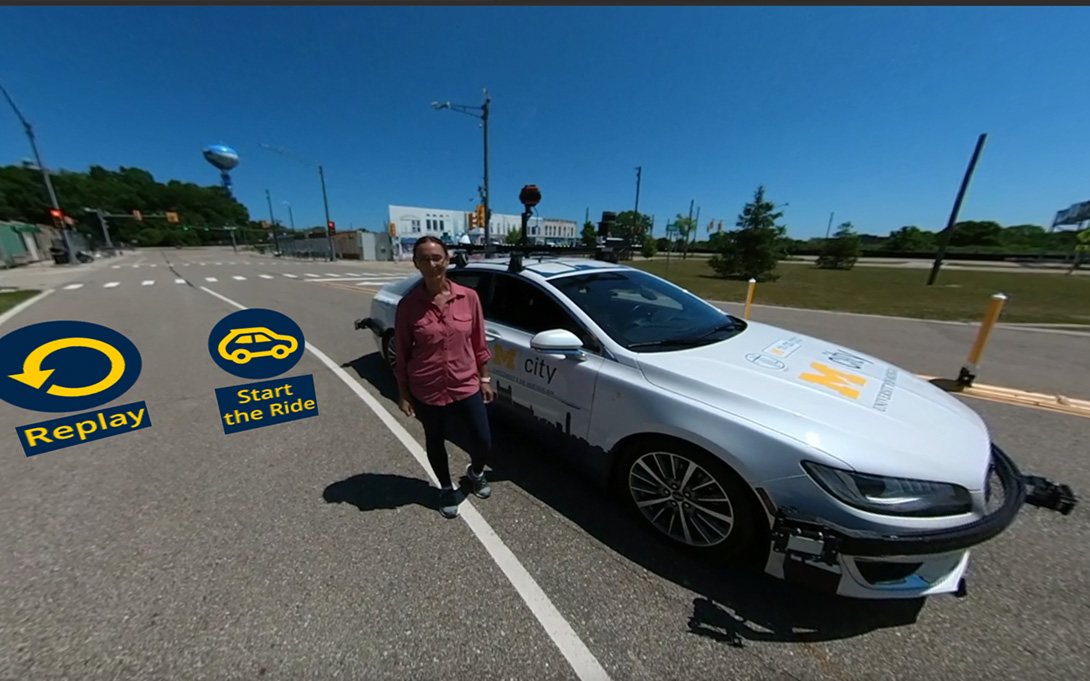
Autonomous and electric vehicles can be a positive force for people and the planet, but widespread gains require government incentives and investment to ensure access for users across the economic spectrum.
That's a key finding of research by Ford School professor Elisabeth Gerber. She focuses on sustainable development and transportation policy, as well as local fiscal capacity and political accountability.
Gerber shares insights on her work, which includes teaching a massive open online course on mobility and co-authoring research on the deployment of EV charging stations across the country.
Much is made of the technological advances, which are important, but your teaching and research also focuses on how decision-makers are building out local EV infrastructure. What are some of the key takeaways for you?
One of the general insights from my research is that new technologies offer the possibility of improving peoples' lives and achieving better social outcomes (like efficiency, equity and sustainability), but those benefits are not guaranteed. People make decisions about how to implement technologies, and those decisions determine who receives the benefits and who pays the various costs of new technology.
In the area of new mobility—including the deployment of autonomous and electric vehicles—many critical decisions are being made by governments at the federal, state and local levels, including decisions about where to build out the infrastructure needed to support these new vehicles. Will people who live in lower income areas have access to charging infrastructure, thereby allowing them to benefit from EV technology, or will only higher income people who can charge at home or their workplace have access?
Much of my current research focuses on the role of local governments in particular, as they are on the front lines making these decisions, but vary tremendously in terms of their resources and technical capacity. So we see some local governments actively adopting innovative new policies to ensure equity and access to charging infrastructure, while many other governments are delegating these decisions to the private sector or are taking no actions.
You co-authored a study about equity and mobility that looks at where EV charging stations are placed. What were some of your findings, and the implications of these efforts?
Earlier this year, we conducted a survey of just under 500 local government officials across the U.S. to learn what they are doing to support the deployment of EV charging infrastructure in their communities, and what factors—public pressure, federal and state government incentives, regulations—are shaping their efforts. Among our findings:
- Only about a third of communities in our (representative) sample have any public charging stations.
- Very few local governments are directly investing in EV charging infrastructure. Rather, their primary roles are efforts to shape private sector actors' decisions through permitting, inspection, land use planning and, in rare cases, zoning ordinances.
- Local government decision-makers respond to positive pressures from their residents—where lots of people are purchasing EVs, decision-makers follow by installing chargers and other infrastructure. In other words, supply follows demand.
- Top-down incentives from the federal and state governments are not enough to spur local governments into action.That's not to say they play no role—over 40% of the local government officials in our sample indicated that they expect to apply for these funds in the future, so the impact of these incentives very well may increase over time. But right now, the consumer demand has to be there first.
Perhaps it has long been true but with the rapid rise and proliferation of automation (including ChatGPT and its variants), there appears to be a large disconnect between the engineering and the ethics. Are we at a point where the social science aspect is finally getting its due consideration alongside the "gee-whiz" technology in the public discourse and policymaking?
I hope so! There are a lot of very thorny ethical issues associated with autonomous vehicles. A big one is privacy. AVs require a ton of data—about their own location, the locations of other drivers, the route to their destination, and the many, many obstacles they encounter along the way—all of which need to be constantly updated. Who owns this data, who has the rights to use it, and how can it be used? What if I don't want others to know my location? Can I withhold that information, and if I do, what does that mean for the integrity of the data that can be used by others?
A second issue is safety. Under the right conditions, AVs can be a lot safer than human-driven vehicles. They don't get distracted or drive while intoxicated, and they can be programmed to follow the speed limit, stop at red lights, use their turn signals, etc. But they are not 100% safe, and there are situations in which the humans that program AVs will need to make judgment calls about the lesser of two evils—for example, should a vehicle be programmed to swerve off the road to avoid an accident, even if it means possibly injuring or killing the driver? These are not technology questions; they are social science questions.
How do you make the case to those who want to see less, not more government involvement?
Leaving decisions about whether and how to build out the infrastructure to support electric and autonomous vehicles to the private sector is almost certainly going to lead to gaps in access.
Private companies have an incentive to invest in places where they can make the most money—not necessarily where there is the greatest social need. But to meet our country's environmental and sustainability goals, we're going to need to ensure that EVs—and the charging infrastructure to power them—are accessible to a much broader range of people than they currently are.
This will require governments to install (or contract with third-party providers to install) charging infrastructure in places where the private sector has opted out, such as near multi-unit housing and apartments so folks who live there will have convenient places to charge. And it may also require bringing down the price of the vehicles through consumer subsidies so that many more people can afford to buy EVs.
The Biden administration and a number of states have already put in place programs to encourage investment in EV infrastructure, especially in disadvantaged communities, and to make EVs more affordable. But there remains much more to be done.
This Q&A was written by Jeff Karoub of Michigan News.
